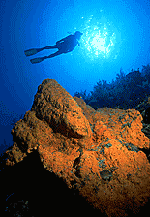SCUBA Diving

Make sure that the diving school you join is associated with one of the major organisations (CMAS, PADI, BSAC, NAUI) which organises training. This ensures a high quality of training.
Prior to your diving exercises, you should have visited a doctor and have undergone a thorough diving-related physical examination. A simple health declaration on location at the diving school does not show that you are healthy, only that you “think” you are.
A few hours of diver’s training can possibly be enough to go for a brief and not-so-shallow “test dive”, but these courses are insufficient for more extensive diving. In addition to good judgement, safe diving also requires more knowledge and experience. Therefore, you should sign up for a basic diving course. If you take such training courses in tropical waters, it might be a good idea still to contact a diving school when you get home, as you will encounter completely different conditions in our cold, dark local waters.
Ear canal inflammation is a common occurrence among divers. Some people seem to be more susceptible to these than others. There are no truly good preventive measures, but if you have a problem, try some ear drops, e.g., Terracortril with polymyxin B.
Wax and wax clots can cause your ears to retain water. When the water dries, the remaining salt and possibly chlorine can cause irritation in the auditory canals. That is why you should keep your ears clear of wax.
If you have any other problems with your ears, contact a doctor!
The air you breathe is very dry, so don’t forget to drink plenty.
If you suffer from unexpected medical symptoms within 24 hours after diving, these can be related to your dive. In such cases, you must contact a doctor as soon as possible (preferably one skilled in diving medicine).
Please note that flying entails a change in air pressure and you should therefore not fly within 24 hours after diving.
